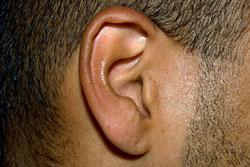Tinnitus is a ringing, swishing, or other type of noise that seems to originate in the ear or head. In many cases it is not a serious problem, but rather a nuisance that eventually resolves.
Transcript
Tinnitus, like a lot of terms in medicine, comes from Latin and basically means ‘to ring’.
Hi, I’m Dr Joe. Tinnitus does pertain to ringing or buzzing in the ears, and it’s again one of those conditions in medicine, which is fairly common, which doesn’t kill anybody but can be quite annoying for people who have it.
Alrighty, what sorts of things lead to tinnitus? Far and away the most common cause is exposure to loud noise. This might be industrial from working without headphones for many years, or people who have been in rock bands or have attended a lot of concerts where they are very loud. This is particularly in the 70s and 80s when noise laws were not quite as strict as today. Now tinnitus does come about because of some degeneration of the little cells in the little part of the ear, in what is called the cochlear. These cells are called the hair cells and are very vital with our hearing. The other major cause of tinnitus can be the beginnings of some loss of hearing. So the beginning can be the cells get a little bit irritated, they start to degenerate a little bit, this causes some firing off and the typical buzzing in the ears, and this may be the first sign of some loss of hearing as we get older in life. In addition to that, there can be some other causes. That can include trauma or damage to the ear, and there are a few medications that can cause it as a side affect. Fortunately that is very rare.
 What can we do if we have tinnitus?
What can we do if we have tinnitus?
Unfortunately there is no absolute cure. There are various things that can be done and fortunately for a lot of people (not everybody), it can improve a little bit with time. Part of that is that we get used to it, much in the same way as when you put your watch on in the morning you can feel it, but after a while you don’t tend to notice it there. With things like buzzing in the ear and tinnitus, much like with floaters in the eye, for most people it just melds into the background after a while and we don’t get as annoyed by it.
For some people it is related to a condition called Meniere’s disease. Then there are some medications that can be used, but I will point out that they are to control rather than cure the condition. For people where it is related to hearing loss, then hearing aids can help with that.
If you go along to your doctor or have a chat with an audiologist there are some different mechanisms that are used to help people cope with the tinnitus. Some of those include some cognitive behavioural therapies. There are also some other programs that are run that can assist people. Nothing works for everybody all the time, so it is important to suss things out a little bit. Have a chat with your GP or an audiologist to find out what your options are.
Do we need to have tests or investigations with tinnitus? Generally it is important to have a hearing test done. In most instances there isn’t much need to do other investigations. Do go along and see your GP. If you have other symptoms he or she may suggest you do some other tests to rule out less common causes, but in most instances that won’t be necessary.
To sum up: tinnitus, it’s not pleasant. For some people it is quite annoying. For most people it is annoying at the start and a little bit less so as time goes by. Unfortunately if you do have it, it is something you will have to live with. There is no absolute cure but, as we mentioned in the video, there are a number of ways of doing things that may help work around the problem.
All content and media on the HealthEngine Blog is created and published online for informational purposes only. It is not intended to be a substitute for professional medical advice and should not be relied on as health or personal advice. Always seek the guidance of your doctor or other qualified health professional with any questions you may have regarding your health or a medical condition. Never disregard the advice of a medical professional, or delay in seeking it because of something you have read on this Website. If you think you may have a medical emergency, call your doctor, go to the nearest hospital emergency department, or call the emergency services immediately.







